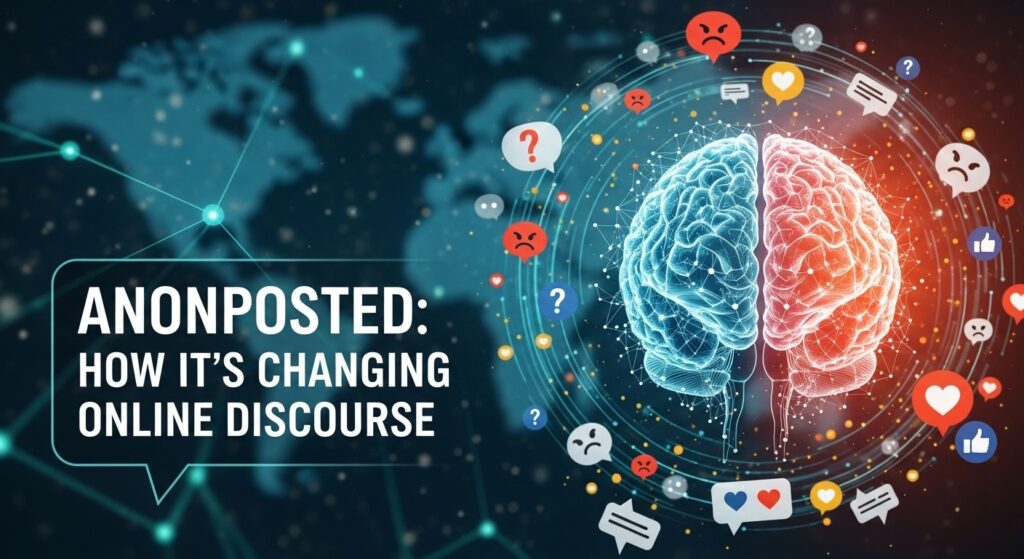In the curated, hyper-personalized world of modern social media, where your profile is your brand and every like is a social credential, a counter-movement thrives in the shadows. This is the world of anonposting—the practice of publishing content on forums and imageboards without a username or persistent identity. Every user is simply “Anonymous.”
But anonposting is more than a niche internet trend; it’s a powerful cultural force that is fundamentally reshaping online discourse. By stripping away identity, it challenges our deepest assumptions about communication, community, and accountability in the digital age. This is a deep dive into the complex, often contradictory, world of anonymous posting and its profound impact on how we talk to each other online.
What is Anonposting? Beyond Pseudonymity
To understand anonposting, it’s crucial to distinguish it from simple pseudonymity. On platforms like Reddit or X (formerly Twitter), you might use a handle like “DataDiva92” or “CryptoPundit.” While not your real name, this identity builds a reputation, a post history, and a recognizable persona over time.
Anonposting, as seen on platforms like 4chan, LynxChan, and various smaller imageboards, eliminates this entirely. There is no registration. There is no username. Every poster is functionally identical, distinguished only by the content and timing of their messages. This creates a unique environment where ideas exist in a pure, authorless state, forced to stand or fall solely on their own merit—or their ability to provoke a reaction.
The Allure of the Mask: The Positive Impacts of Anonposting on Discourse
The primary draw of anonposting is liberation. By removing the fear of social and professional repercussions, it creates a space for a uniquely raw form of expression.
1. A Level Playing Field for Ideas
On mainstream social media, an argument is often judged by the poster’s credentials, follower count, or profile picture. Anonposting short-circuits this “appeal to authority.” A cogent point stands because it is cogent; a weak one is torn apart by the crowd, regardless of its source. This can, in theory, create a more pure marketplace of ideas, fostering critical thinking over credential-worship.
2. Unleashing Creativity and Niche Communities
Without the pressure to maintain a cool or consistent persona, users feel free to explore bizarre, niche, or “cringe” interests. This uninhibited environment has been a petri dish for internet culture, birthing countless memes, viral trends, and collaborative art projects like the r/Place phenomenon on Reddit (which, while not fully anonymous, captured the spirit). Technical support and knowledge-sharing on anonymous boards can be astonishingly detailed and altruistic, precisely because no one is seeking credit.
3. A Safe Haven for the Vulnerable
For individuals exploring sensitive topics—from LGBTQ+ identity and mental health struggles to escaping high-control groups—anonposting provides a vital lifeline. It offers a space to ask embarrassing questions, share painful experiences, and seek advice without the terrifying risk of being doxxed or ostracized from their real-life communities.
The Dark Side of Anonymity: The Erosion of Civil Discourse
However, the same features that enable creativity and vulnerability also unleash the darkest aspects of online interaction. This is the central paradox of anonposting and online discourse.
1. The Toxic Disinhibition Effect
Psychologists refer to the “online disinhibition effect,” where anonymity loosens social restraints. The anonposting environment supercharges this. The absence of any accountability can embolden users to express the virulent racism, misogyny, and hatred they would never attach to a persistent identity. This transforms some threads into cesspools of coordinated harassment and extremist rhetoric.
2. The Misinformation Firehose
Without a reputational cost, there is no incentive for truthfulness. A user can make a blatantly false claim, and by the time the community has fact-checked and dismissed it, the poster has vanished, only to reappear seconds later with a new falsehood. This “firehose of falsehood” strategy is highly effective for trolling, propaganda, and manipulating perception within a thread, making reasoned debate almost impossible.
3. The Erosion of Community and Trust
Healthy online communities are often built on trust, reciprocity, and shared history among persistent identities. Anonposting eliminates this social glue. The community is ephemeral, existing only within a single thread. There are no leaders, no respected voices, and no consequences for burning bridges. The result is a more chaotic, paranoid, and ultimately fractured social experience, where collaboration is fleeting and trust is nonexistent.
The Psychological and Cultural Ripple Effects
The impact of anonposting culture extends far beyond the borders of imageboards, influencing the broader digital landscape.
The “Post-Ironic” Sensibility
The dominant communication style on anonymous forums is laconic, ironic, and often nihilistic. Sincere expression is masked behind layers of irony and memes as a defense mechanism against vulnerability and criticism. This “post-ironic” sensibility has become a default mode for many young people online, creating a communication barrier that is alienating to outsiders and often makes it impossible to distinguish genuine belief from performative edginess.
The Power of the Leaderless Swarm
Anonposting culture has perfected a model of “swarm activism.” Without central leadership, anonymous users can rapidly coalesce around a goal, whether it’s a hacktivist campaign (as seen with the early Anonymous group), a fundraising drive, or a coordinated harassment campaign. This structure is powerful and resilient because it has no head to cut off, demonstrating the potent, real-world consequences of this faceless form of organization.
The Future of Online Discourse in an Anonymous Age
Anonposting is not a fleeting anomaly; it is a foundational and permanent part of the internet’s ecosystem. It represents a deep-seated human desire for a space beyond the panopticon of social surveillance.
The critical question for the future of digital communication is not how to eliminate anonymity, but how to grapple with its inherent trade-offs.
-
For Platform Designers: Is it possible to design systems that capture the creative, equalizing potential of anonposting while mitigating its capacity for harm? Some experiments include optional anonymity, ephemeral identities that last for a single session, or heavy, human-led moderation to enforce basic civility.
-
For Users: Engaging in or observing these spaces requires a new form of media literacy. Understanding the cultural codes, the rhetorical tactics, and the psychological drivers of anonposting is essential to navigating this landscape without being manipulated or overwhelmed.
Conclusion: A Mirror to the Digital Soul
Anonposted content holds up a mirror to the internet itself. It demonstrates that when you remove the constraints of identity, you don’t get a blank slate. Instead, you get humanity in its rawest form—simultaneously brilliant and ugly, creative and destructive.






